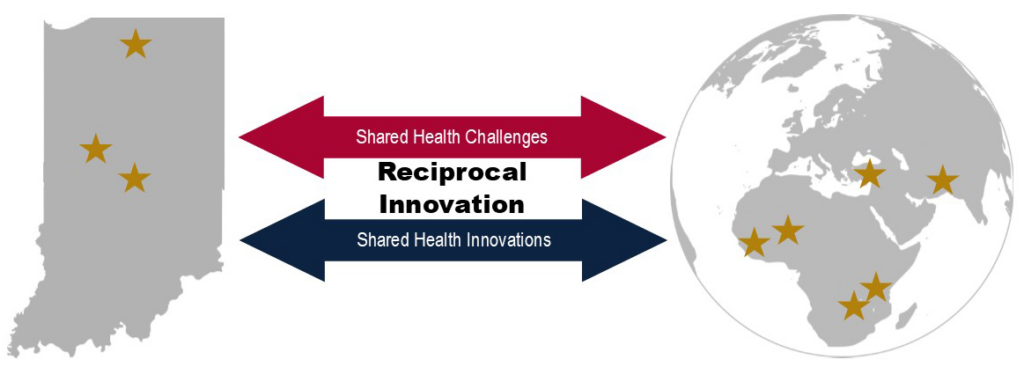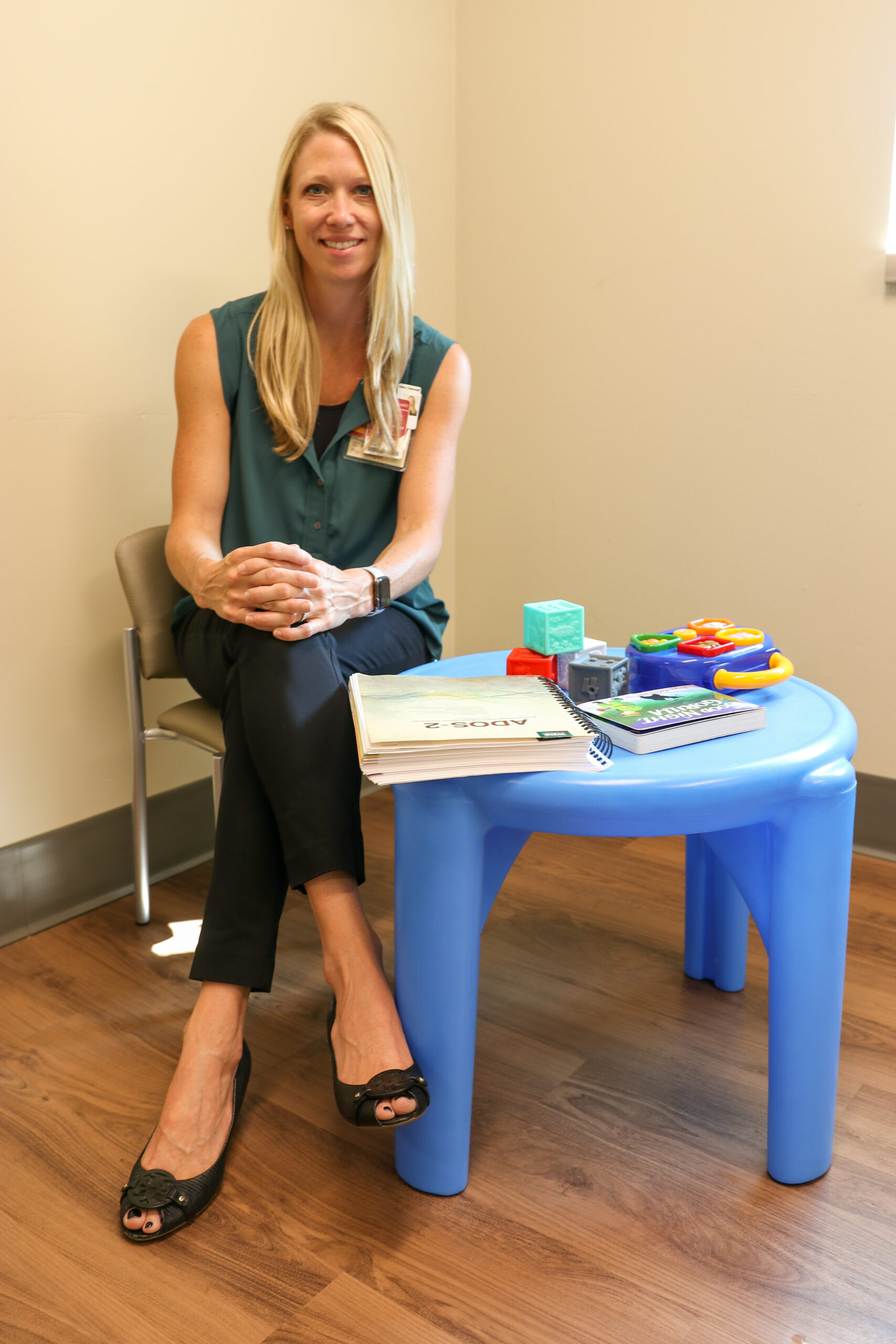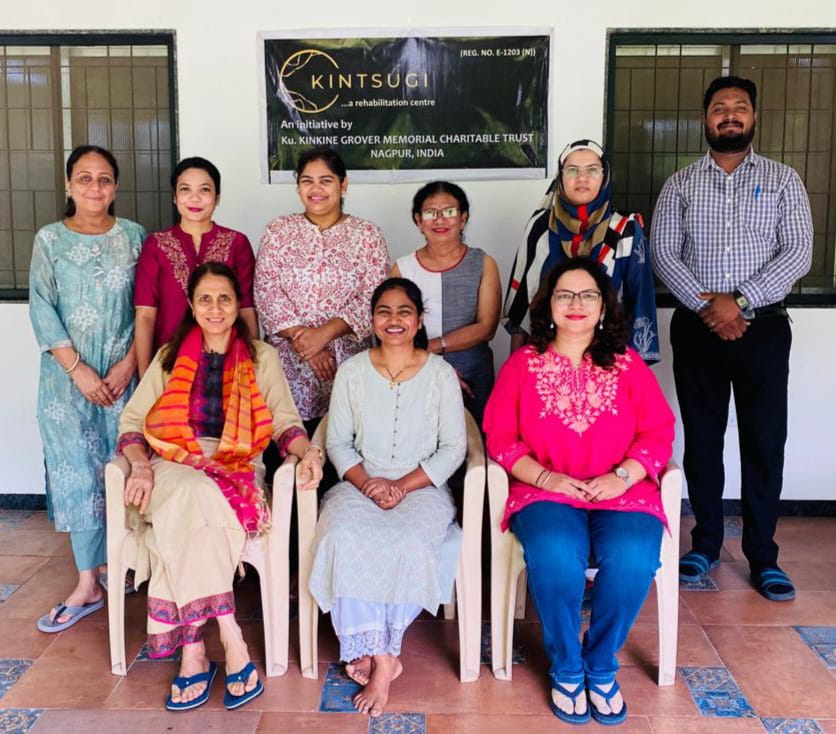Global Health Reciprocal Innovation Planning Grants Awarded
Two research projects with the potential to improve care for people in India and Kenya, as well as Indiana, received planning grants from the Indiana Clinical and Translational Sciences Institute (CTSI) and IU Center for Global Health Equity to develop new global health collaborations

Led by Indiana University faculty members, the reciprocal innovation planning grants for $10,000 will establish new partnerships related to diagnosing chronic respiratory diseases and autism.
The reciprocal innovation grants fund research in shared priority areas for global partners and Indiana with innovations that can work in diverse settings around the globe. “In global health research, reciprocal innovation is a collaborative process to exchange lessons learned and co-develop technology and health innovations with mutual benefit to health partners in both low- and middle-income countries (LMIC) and the United States,” said Laura Ruhl, MD, MPH, director of reciprocal innovation for the IU Center for Global Health Equity. Investigators from the Indiana CTSI partner institutions (IU, Purdue, and Notre Dame) are eligible to lead the grants with collaborators from both the U.S. and their partners in LMIC.
Improving Diagnosis of Respiratory Disease
Caitrin Kelly, MD, MPH, assistant professor of medicine at IU School of Medicine, and a team of collaborators lead the project titled, “Implementation of Quality Spirometry to Improve Diagnosis of Airway Disease in the Primary Care Setting in Kenya.”
“Spirometry is a simple test that measures airflow through the lungs when a patient inhales and exhales into a device and is the gold stand for diagnosis of airway diseases such as chronic obstructive pulmonary disease (COPD) and asthma,” said Dr. Kelly, principal investigator. “Access to spirometry for accurate diagnosis is a major challenge in western Kenya and among underserved populations in the United States. In Kenya, COPD and asthma are common chronic diseases due to prevalence of indoor air pollution from cooking fires.”
Working through the Academic Model Providing Access to Healthcare (AMPATH) Kenya Partnership, the team will build upon a new integrated lung health clinic at Webuye Hospital in rural western Kenya to pilot integration of spirometry services in the primary care setting. Utilizing experienced spirometry research assistants at Moi Teaching and Referral Hospital (MTRH), they will train and mentor healthcare workers to conduct spirometry for referred patients in Webuye and create a database to compare clinical diagnosis to spirometry results, as well as provide feedback on spirometry quality measures.
Kenyan collaborators including Bungoma County Ministry of Health and Webuye Hospital leadership and doctors Jeremiah Laktabai, MBChB, MMed, and Hussein Elias, MD, MMed, with the Moi University Department of Family Medicine. Spirometry training and mentorship will be conducted with Lusweti Carolyne Khisaan, MBChB, MMed, internal medicine consultant and pulmonology researcher at MTRH, and Neelima Navuluri, MD, MPH, a Duke University pulmonology and critical care physician conducting research at MTRH with significant experience in spirometry.
“This is a critical addition to quality patient care, given that spirometry services are not available in the region, making diagnosis and management of chronic lung diseases suboptimal,” said Dr. Laktabai. “This will also be an opening to the introduction of quality chronic lung disease care to the AMPATH chronic disease management program which currently focuses on hypertension, diabetes, mental health, and sickle cell care.”
“Piloting spirometry in the primary care setting aligns with the broader goals of strengthening healthcare systems and promoting equitable access to essential services, particularly in resource-limited settings like Kenya,” added Dr. Navuluri. The results of this pilot study will provide foundational data to support a large implementation science grant to expand integration of spirometry into primary care in Kenya and rural Indiana.
Improving Autism Diagnosis in Indian Communities

Rebecca McNally Keehn, PhD, HSPP, is an assistant professor of pediatrics at IU School of Medicine and clinical psychologist. She is the principal investigator for the grant titled “Child Neurodevelopment Beyond Borders” that seeks to build a collaborative partnership in India and with people of Indian descent in Indiana to deepen the understanding of the knowledge, attitudes, and practices regarding autism detection and diagnosis in individuals of Indian origin.
“Autism is a neurodevelopmental disability that affects 1-3% of children globally,” said Dr. McNally Keehn. “Epidemiological studies among Indians living in India and the United States suggest a vast underestimate of prevalence due to unique cultural factors that impact identification and healthcare access in both communities. This is an opportunity to build a global research collaboration that seeks to understand the influence of specific cultural viewpoints on autism diagnosis as well as support the development of culturally grounded autism detection methods.”
Dr. McNally Keehn is also co-director of Indiana’s Early Autism Evaluation Hub system, a statewide network of primary care providers trained to conduct diagnostic evaluations in low resource communities of Indiana. Currently, as part of the AMPATH Kenya partnership, she is leading research on autism diagnostic training at Moi Teaching and Referral Hospital and collaborating on capacity building in autism education and intervention services.
Archana Patel, MD, DNB (Pediatrics), MSCE, PhD, program director at the Lata Medical Research Foundation (LMRF), in Nagpur, India, is the co-principal investigator of the project who conceived and proposed the title for this collaboration. LMRF is a research institute that collaborates with medical teaching institutes, the KINTSUGI Rehabilitation Center and the state government public health systems to conduct epidemiological research to improve maternal and child health outcomes aligned with UN Sustainable Development Goal targets. Samreen Sadaf Khan, BAMS, PGDPHN, MPH, is a study coordinator at LMRF and a collaborator on the project.
“In our setting, there is no universal population approach to autism screening resulting in delayed symptom recognition and entry into developmental care,” said Dr. Patel. “Because of the unique contextual and cultural factors in our setting, it will be critical to understand the factors and indigenous viewpoints when designing and implementing solutions for advancing autism detection.”
In Indianapolis, Dr. McNally Keehn and her collaborator Manasa Swaminathan, MS, clinical psychology doctoral student, will deepen collaboration with Mahesh Goel, MD, and the Hindu Temple of Central Indiana to understand how cultural viewpoints impact autism service access in Indian American communities.

“Many Indian Americans are presently unaware of the significance of early recognition of developmental and behavioral concerns in young children. This could be due to specific cultural barriers. So, opportunities for early intervention and family support are often overlooked,” said Dr. Goel, founder and administrator in-charge of the Hindu Temple of Central Indiana Clinic. “We are enthusiastic about the chance to learn from both the project itself and experts specializing in autism care in Indiana and offer our expertise as cultural and community leaders.” This project will further strengthen the research ties and bring further opportunities between these two communities.
At the conclusion of the planning grant, the research group aims to submit a reciprocal innovation demonstration grant proposal focused on adapting and implementing autism screening in India and Indian American communities in Indiana. The long-term goal of this work is to develop a proposal to the National Institutes of Health to conduct an implementation-effectiveness trial of a culturally adapted autism screening process in the U.S. and India that will enable opportunities for early intervention and family support.
Reciprocal Innovation Planning Grant Program
Over the last eight years, the Indiana CTSI and IU Center for Global Health Equity have awarded more than $900,000 through the Global Health Reciprocal Innovation grant program. Supported by the Indiana CTSI and funding by the U.S. National Center for Advancing Translational Sciences (grant number UM1TR004402), the planning and demonstration grants are awarded annually. The next round of RFAs (Request for Applications) will be released at the end of this year.
The Fogarty International Center (FIC) at the U.S. National Institutes of Health is highlighting the concept of reciprocal innovation through recent publications and a panel presentation at AIDS 2024, the 25th International AIDS Conference in Munich, Germany.
For more information, please contact Rish O’Brien.